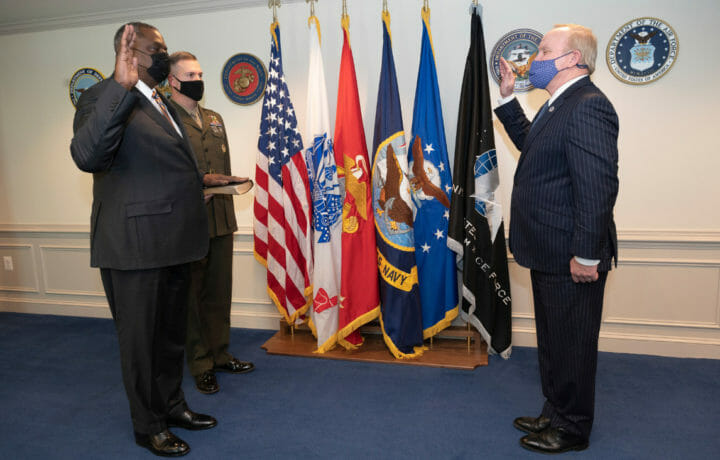Since being confirmed by the United States Senate on January 22, in a near-unanimous 93-2 vote, the new Secretary of Defense Lloyd J. Austin III has been busy. He has already spoken with NATO Secretary General Jens Stoltenberg, the UK’s Secretary of State for Defence Ben Wallace, Japanese Defense Minister Nobuo Kishi, and Republic of Korea Minister of National Defense Suh Wook.
Austin’s call to Secretary General Stoltenberg – the first made to a foreign leader since taking his post – was to reinforce the importance of the NATO alliance to the United States; while in his call to the UK’s Wallace, he reaffirmed the importance of the special relationship that exists between the two countries.
Competent Civilian Control
The first African American defense secretary in U.S. history, Austin is also a retired four-star U.S. Army general and that required a waiver for him to serve in the position as he has been out of uniform for only four of the legally mandated seven-year period.
The National Security Act of 1947 created the rule to ensure that civilian control over the military is maintained.
“The safety and security of our democracy demands competent civilian control of our armed forces,” the 67-year-old Austin told lawmakers during his confirmation hearing before the Senate Armed Services Committee, and added, “The subordination of military power to the civil.”
Austin has also further promised that he will surround himself with “experienced, capable civilian leaders,” while he has vowed to hire a chief of staff who would not be a military person.
West Point to the Iraq
Born in August 1953 in Mobile, Alabama, Austin graduated from the United States Military Academy (West Point) with a Bachelor of Science degree in 1975. His initial assignment was to the 3rd Infantry Division in Germany, and after attendance at the Infantry Officer Advanced Course, he was assigned to the 82nd Airborne Division at Fort Bragg.
He served as operations officer for the Army Indianapolis District Recruiting Command followed by command of a company in the Army Recruiting Battalion. He later attended Auburn University and earned a Master of Arts degree in education and served as a company tactical officer at West Point.
In addition to a Master of Business Administration in business management degree from Webster University, Austin is also a graduate of the Infantry Officer Basic and Advanced courses, the Army Command and General Staff College, and the Army War College.
He has served as Chief, Joint Operations Division, J-3, on the Joint Staff; and he was Assistant Division Commander for Maneuver (ADC-M) during the 2003 invasion of Iraq – for which he was awarded a Silver Star for his actions as commander. In August 2009, he was named Director of the Joint Staff, and a year later he became Commanding General (CG) of the United States Forces – Iraq (USF-I). Along with other members of the USF-I, Austin departed Iraq on December 18, 2011.
He was nominated Vice Chief of Staff of the United States Army (VCSA) and took office in January 2013. In that position, he managed the day-to-day administration of the Army’s budget and headquarters staff.
CENTCOM to the Private Sector
Austin was nominated by President Barack Obama to the position of commander of the United States Central Command, and took up the post in March 2013. He took the approach to be an “invisible general” due to his reluctance to speak publicly on military matters. During a Senate Committee on Armed Services hearing, he admitted that the U.S. program intended to train Syrians to combat ISIL/ISIS had not been a success.
Austin retired from the military on April 5, 2016 and that same month joined the board of Raytheon Technologies. He has also been appointed to the Nucor’s board of directors and has served as an independent director on the board of Tenet Healthcare.
In retirement from the military, Austin has also operated a consulting firm and has been a partner at investment company Pine Island Capital.
Along with Gen. James Mattis, U.S. Army (Retired), Austin is the second former CENTCOM command to serve as secretary of defense.
Day One Message
During his secretary of defense confirmation hearing, Austin had vowed to prioritize making the military “a working environment free of discrimination, hate and harassment,” and he added he would work hard to stamp out sexual assault, and to rid the ranks of racists and extremists. In his Day One Message he addresses the sacrifices those in uniform make to keep the country safe.
“My job as Secretary of Defense is to make you more effective at doing yours. That means ensuring you have the tools, technology, weapons, and training to deter and defeat our enemies. It means establishing sound policy and strategy and assigning you clear missions. It means putting a premium on cooperation with our allies and partners. And it means living up to our core values, the same ones our fellow citizens expect of us.”


